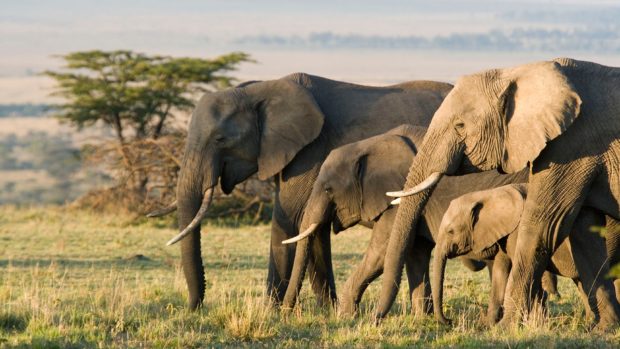Why the extinction of elephants could be bad news for climate mitigation

For the past 30 years, African elephants have been gradually dying out. This decline could have a consequence that has been previously underestimated, as research suggests that it could affect the ability of African rainforests to capture atmospheric carbon. (ETX Daily Up)
African elephants are under threat. In the space of three decades, their population has fallen by more than 80 percent. A worrying decline, mainly linked to the intensive poaching that is rampant in this region of the world. But the extinction of this species could also have direct consequences on global warming and, more precisely, on the ability of forests to absorb and store carbon, according to research published in the journal, PNAS.
Conducted by researchers from Saint Louis University in the US, in collaboration with scientists from France’s National Center for Scientific Research (CNRS), the paper highlights the impact that the disappearance of elephants could have on the forests of the Congo Basin and West Africa. According to the researchers’ estimates, the world’s second-largest rainforest could lose between 6% and 9% of its carbon storage capacity.
There are two main reasons for this. First, African elephants feed almost exclusively on vegetation. And given their size, these pachyderms do not hesitate to strip branches and uproot young trees to feed. This mode of feeding allows for the regulation of forest ecosystems, notably favoring growth conditions for high carbon density trees by thinning out low carbon density species. “Our data shows most of this damage [caused by elephants eating] occurs to low carbon density trees. If there are a lot of high carbon density trees around, that’s one less competitor, eliminated by the elephants,” explains the paper’s senior author, assistant professor of biology at Saint Louis University, Stephen Blake, in a statement.
The second reason that global warming may be exacerbated by the decline of this elephant population is that elephants spread (through their droppings) undamaged seeds that are ready to germinate, and which can give rise to the largest trees in the forest. “These results demonstrate the importance of megaherbivores for maintaining diverse, high-carbon tropical forests. Successful elephant conservation will contribute to climate mitigation at a globally-relevant scale,” conclude the study authors.
The scientists now plan to conduct further research to assess the ecological impact of other animals on tropical forest biodiversity. “The implications of our study extend beyond just forest elephants in Africa,” explains lead author Fabio Berzaghi, of France’s Laboratory of Climate and Environmental Sciences at the time of the study. “As we show that leaves from low carbon density trees are less palatable to herbivores, those findings imply that other large herbivores, such as primates or the Asian elephant, could also contribute to the growth of high carbon density trees in other tropical forests. Our aim is to expand on this by investigating those other species and regions.”














